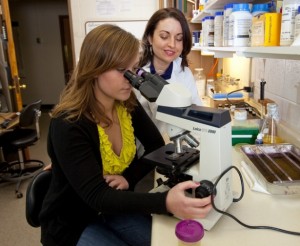Students in Megan Rothenberger’s Environmental Issues in Aquatic Ecosystems class are tackling problems using expertise and resources from biology and civil engineering.
As part of the course, students visited a local constructed wetland. There, David Brandes and Art Kney, both associate professors of civil and environmental engineering, explained how aggressive invasive plants and seasonal algal blooms present potential management problems for the wetland. Then the biology students used sampling and analytical methods to study the problems and propose solutions.

Professor Megan Rothenberger, right, works in the lab with Alyssa Calomeni ’11.
This cross-disciplinary experience came about as part of the Biology Department’s new infusion program, which is intended to make the biology curriculum more interdisciplinary.
“The infusion program gives us a reason to discuss the advantages of connecting and integrating several academic schools of thought in order to find better solutions to complicated issues, such as global climate change, water pollution, and overfishing,” says Rothenberger, assistant professor of biology.
In addition to incorporating elements of civil engineering, the Biology 341 course includes a geology module that discusses paleoceanography and climate change.
“I like the fact that the infusion program gives me the opportunity to highlight—and make more visible to the students—the interdisciplinarity of conservation issues,” Rothenberger says.
The initiative is one of many funded by an $800,000 grant from the Howard Hughes Medical Institute, which is meant to increase the number of science-based research opportunities, minority and female students studying the sciences, and elements of the sciences in other disciplines.
The Biology Department worked with faculty in other departments to infuse biology courses with interdisciplinary modules such as bioethics, computer science, engineering, health economics, law, environment, policy, globalization, and cultural attitudes. They developed a variety of courses that incorporate at least two modules from other disciplines.
“One of the hopes for the program is that students will learn to build connections with other disciplines to help make them better problem solvers,” says Robert Kurt, professor and head of biology. “Students who take an infused course should be able to articulate the issues impacting an interdisciplinary problem and address it using analytical and/or computational skills.”
Three of the infusion courses are being offered this fall and three others will begin in the spring semester. In addition to the Environmental Issues in Aquatic Ecosystems class, these include:
- A Biology 101 course that brings in the perspective of the Women’s and Gender Studies Program to highlight women and science, and discusses cancer and modeling, with input from the Computer Science Department.
- A Human Physiology course, taught by Mike Butler, assistant professor of biology, infuses elements of chemistry and mechanical engineering, with modules on the biochemistry of receptors, channels, and transport proteins, and fluid dynamics within the cardiovascular system.
- Butler’s course on the Physiology of Extreme Animals incorporates a geology module that discusses energy constraints in dinosaurs, and a mechanical engineering module that uses motion-capture cameras to demonstrate the biomechanics of muscle movements in humans as they relate to energy use in primates with different locomotion methods.
- An Agricultural Ethics class, also taught by Rothenberger, incorporates elements of gender studies and engineering studies.
- Rothenberger’s Plant Biology class will infuse a geology module that involves prehistoric extreme plants, and an ethnobotany module that will explore ways that plants have shaped human livelihoods and culture.
“I hope the students are able to experience the advantages of teamwork and cooperation, critically evaluate multiple perspectives on a topic—for example, by thinking about climate change like a biologist and a geologist—and discuss controversial issues with people who have different values, beliefs, or backgrounds,” Rothenberger says.
